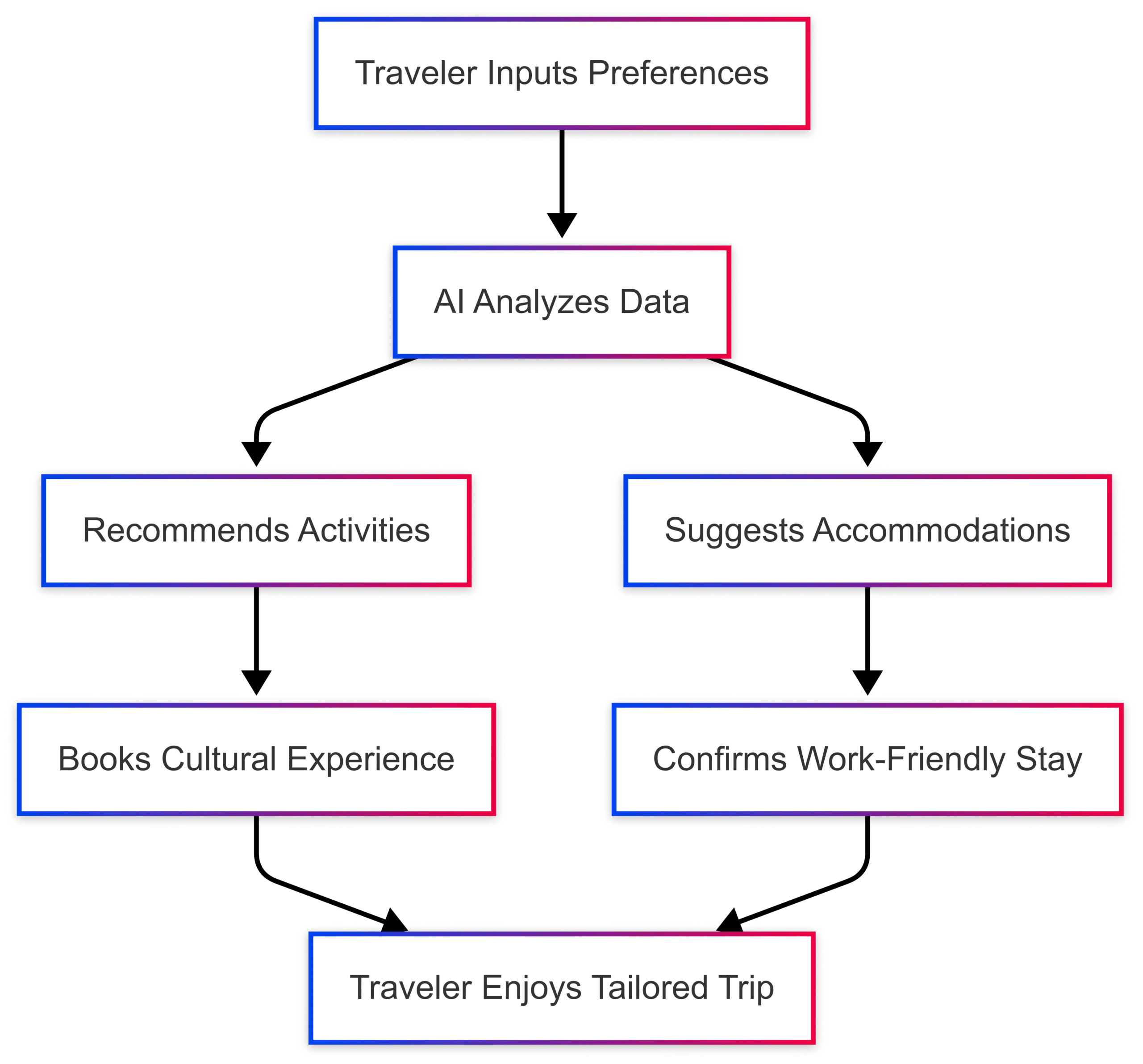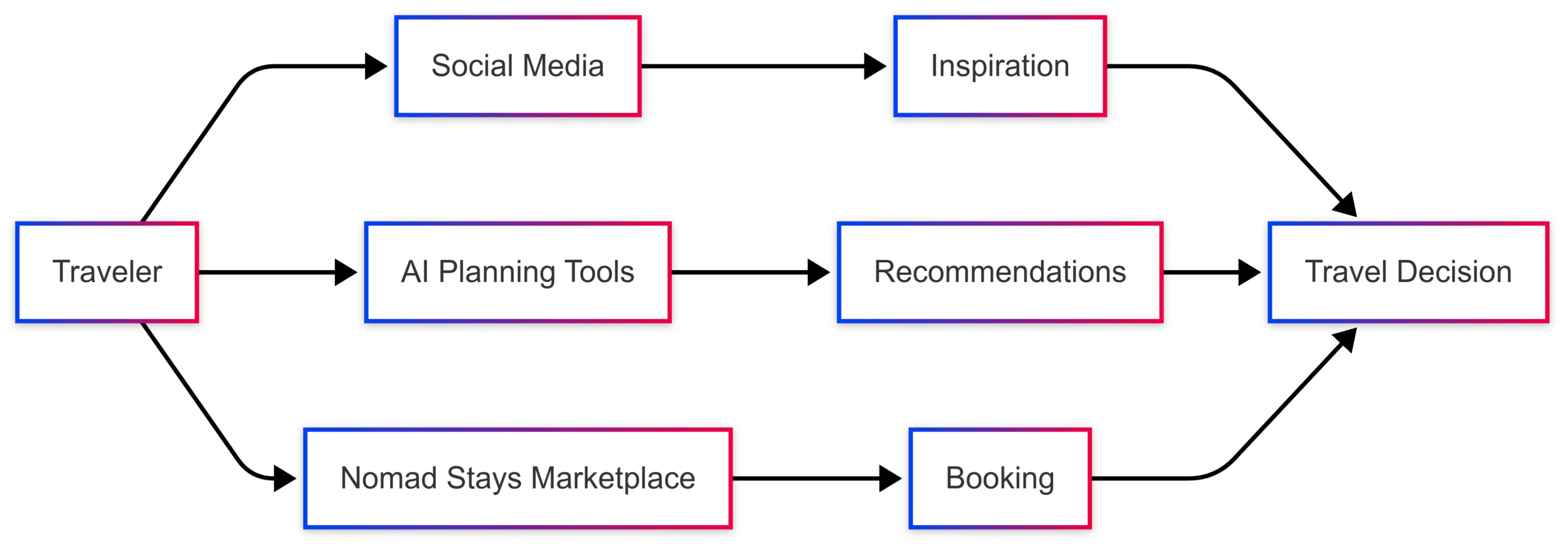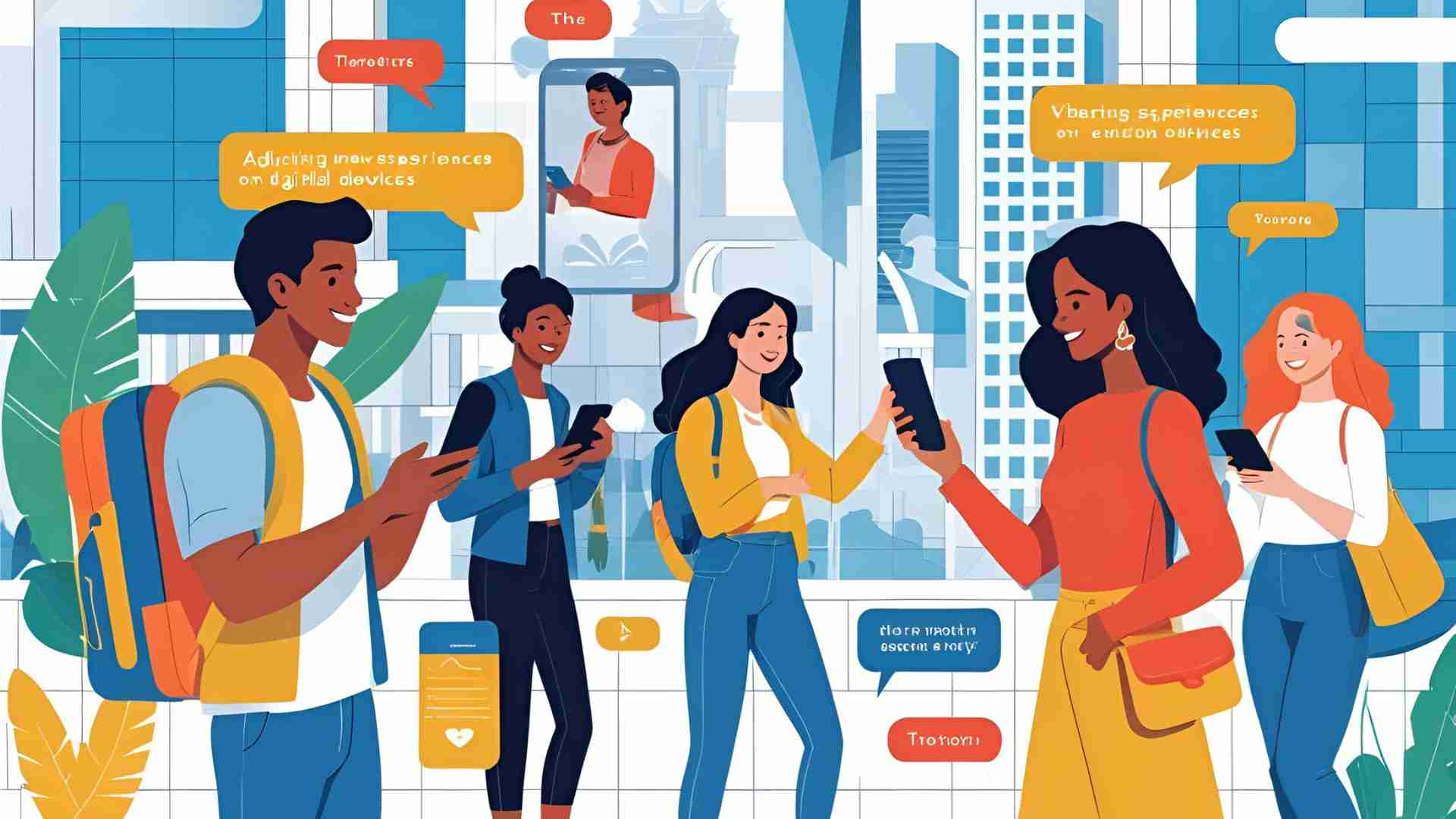Explore the hybrid travel culture’s impact on customer behaviors and how travel businesses adapt with flexibility, personalization, and community-building.
The travel industry is navigating a transformative era driven by the rise of the hybrid travel culture (HTC). This phenomenon, fueled by the convergence of remote work, evolving consumer values, and technological advancements, has reshaped how people travel, work, and live. Hybrid travelers—often aged 35–55, rather than the stereotypical 20–25 digital nomad demographic—seek seamless integration of work, leisure, and cultural exploration. Their behaviors reflect a shift toward flexibility, personalization, and community, challenging travel businesses to adapt swiftly to remain competitive. This article delves into the core aspects of the hybrid travel culture, examines its driving forces, and outlines actionable strategies for travel brands to thrive in this dynamic landscape.
Understanding the Hybrid Travel Culture
The hybrid travel culture is defined by its fusion of professional and personal pursuits. Unlike traditional tourists, hybrid travelers prioritize experiences that allow them to work remotely while immersing themselves in new destinations. This demographic values freedom, authenticity, and meaningful connections over rigid itineraries or cookie-cutter vacations. Their psychographics reveal a focus on experiential travel, driven by a desire to align their journeys with personal values such as sustainability, cultural immersion, and flexibility.
Demographic and Psychographic Insights
Hybrid travelers are not the backpacking Gen Z stereotype but a more established group, often professionals or entrepreneurs with stable incomes. Research indicates that 60% of digital nomads are now over 35, with many in their 40s and 50s, seeking destinations that support both productivity and personal growth. Their motivations include:
- Experiential Freedom: Seeking unique, locally inspired experiences over material purchases.
- Work-Life Integration: Prioritizing destinations with robust remote work infrastructure, such as high-speed Wi-Fi and coworking spaces.
- Value-Driven Choices: Aligning with businesses that reflect their ethical stance on sustainability and community support.
This shift in consumer priorities has led to the “Adaptive Travel Economy,” where economic pressures and personal aspirations converge to shape travel behaviors. Despite global financial challenges, travel remains a priority, with 79% of consumers planning to maintain or increase their travel frequency, according to industry surveys.
Key Drivers of the Hybrid Travel Culture
Several factors fuel the rise of HTC:
- Remote Work Revolution: The normalization of remote work has untethered professionals from traditional office spaces, enabling location-independent lifestyles.
- Technological Advancements: AI-driven platforms and digital tools simplify travel planning, offering personalized recommendations and flexible booking options.
- Economic Pressures: High inflation and cost-of-living concerns push travelers toward value-driven, budget-conscious options without sacrificing quality.
- Social Media Influence: Platforms like Instagram and TikTok inspire younger travelers, while older demographics rely on web-based research, creating a diverse planning ecosystem.
These drivers underscore the need for travel businesses to pivot toward agility and innovation to meet evolving consumer expectations.
Adapting to New Customer Behaviors
To thrive in the hybrid travel culture, travel businesses must align their offerings with the unique needs of this demographic. Below are the key strategies, supported by practical examples and data-driven insights.
1. Embracing Remote Work-Friendly Environments
The shift to remote work has redefined travel accommodations. Hybrid travelers demand spaces equipped for productivity, such as high-speed internet, ergonomic workspaces, and access to coworking facilities. Hotels, hostels, and vacation rentals are adapting by transforming traditional rooms into remote work hubs.
Practical Implementations
- Coworking Spaces: Properties like Selina and Outsite offer integrated coworking areas with high-speed Wi-Fi, communal kitchens, and networking events.
- Amenity Upgrades: Chains like Marriott and Hilton have introduced “work-from-anywhere” packages, including day passes for workspaces and enhanced connectivity.
- Marketplace Platforms: Nomad Stays’ Marketplace connects hybrid travelers with accommodations tailored for remote work, offering filters for Wi-Fi speed, desk availability, and proximity to coworking spaces.
Data Snapshot
A survey by Booking.com found that 68% of travelers prioritize accommodations with reliable internet, while 54% seek dedicated workspaces. This trend is particularly pronounced among hybrid travelers, with 73% willing to pay a premium for work-friendly amenities.
2. Prioritizing Personalized Experiences
Hybrid travelers crave authentic, tailored experiences that reflect their interests and lifestyles. Whether it’s a culinary tour in Seoul or a yoga retreat in Bali, these consumers seek immersive activities that blend work and leisure.
Strategies for Personalization
- Curated Itineraries: Travel brands can use AI to recommend activities based on traveler preferences, such as adventure, wellness, or cultural exploration.
- Local Partnerships: Collaborating with local guides and businesses enhances authenticity, offering experiences like farm-to-table dining or artisanal workshops.
- Flexible Packages: Platforms like Nomad Stays allow travelers to customize bookings, selecting accommodations that match their work schedules and leisure goals.
Example: Nomad Stays’ Marketplace
Nomad Stays’ platform offers a diverse range of properties, from urban lofts with coworking access to rural cabins with scenic views, enabling travelers to choose spaces that align with their unique needs. The platform’s user-friendly interface and detailed filters ensure a personalized booking experience.
Chart: Personalization Workflow

3. Enhancing Agility and Flexibility
The hybrid travel culture thrives on adaptability. Economic uncertainties and shifting schedules require travel businesses to offer flexible policies that instill confidence in travelers.
Key Initiatives
- Flexible Cancellation Policies: Airlines like Delta and accommodation platforms like Airbnb have introduced penalty-free changes to attract cautious travelers.
- Last-Minute Booking Options: Expedia reports a 25% increase in last-minute bookings, driven by spontaneous travel trends among hybrid travelers.
- Transparent Communication: Real-time updates on safety protocols and booking terms build trust, as seen with Nomad Stays’ clear policy displays.
Table: Flexibility Features Comparison
| Platform | Cancellation Policy | Last-Minute Booking | Transparent Terms |
|---|---|---|---|
| Nomad Stays | Free up to 48 hours | Yes | Detailed FAQs |
| Airbnb | Flexible options vary | Yes | Policy summaries |
| Booking.com | Free for select listings | Yes | Clear guidelines |
| Expedia | Varies by provider | Yes | Limited clarity |
4. Fostering Community Building
Community is a cornerstone of the hybrid travel culture. Travelers seek connections with like-minded individuals, whether through coworking spaces, social events, or online platforms.
Community-Building Strategies
- Networking Events: Properties like WeWork and Selina host workshops and social gatherings to foster collaboration among remote workers.
- Online Communities: Nomad Stays’ Marketplace includes forums where travelers share tips, plan meetups, and exchange experiences.
- Shared Spaces: Accommodations with communal areas, such as kitchens or lounges, encourage organic interactions among guests.
Data Insight
A study by Lonely Planet found that 62% of hybrid travelers value opportunities to connect with others, with 45% joining local events or meetups during their trips.
5. Leveraging Technology for Engagement
Technology is the backbone of the hybrid travel culture, enabling seamless planning, booking, and communication. AI, social media, and digital platforms play a pivotal role in shaping consumer behaviors.
Technological Innovations
- AI-Powered Planning: Tools like Google Travel and Hopper use predictive algorithms to suggest budget-friendly destinations and optimal booking times.
- Social Media Influence: Instagram and TikTok drive 58% of travel inspiration among Gen Z and Millennials, per a Skift report.
- Marketplace Platforms: Nomad Stays integrates AI to match travelers with properties, offering real-time availability and personalized recommendations.
Chart: Technology Integration

Implications for Travel Brands
The hybrid travel culture presents both challenges and opportunities for travel businesses. To capitalize on this trend, brands must adopt a multifaceted approach that balances innovation, flexibility, and customer-centricity.
Strategic Recommendations
- Targeted Marketing: Segment audiences by demographics (e.g., families, solo travelers, older professionals) and tailor campaigns to their unique needs.
- Product Diversification: Offer a range of options, from budget-friendly stays to luxury work-leisure packages, to cater to diverse income levels.
- Sustainability Focus: Highlight eco-friendly practices, such as carbon-neutral accommodations, to appeal to environmentally conscious travelers.
- Digital Optimization: Enhance online platforms with intuitive interfaces, real-time data, and AI-driven personalization to streamline the booking process.
Pricing and Specifications
While specific pricing varies by destination and provider, here’s a sample of offerings on Nomad Stays’ Marketplace:
| Accommodation Type | Price Range (USD/night) | Key Features |
|---|---|---|
| Urban Coworking Loft | $80–$150 | High-speed Wi-Fi, desk, city access |
| Rural Retreat Cabin | $50–$100 | Scenic views, quiet workspace, Wi-Fi |
| Beachside Villa | $120–$250 | Private office, pool, coworking proximity |
These prices reflect the platform’s focus on value-driven options, with flexible cancellation policies and transparent terms.
Broader Societal and Economic Impacts
The hybrid travel culture extends beyond the travel industry, influencing economic resilience and cultural exchange.
- Economic Boost: By attracting hybrid travelers, destinations can stimulate local economies through spending on accommodations, dining, and activities.
- Cultural Exchange: Immersive travel fosters cross-cultural understanding, as travelers engage with local communities and traditions.
- Workforce Evolution: The rise of remote work encourages businesses to adopt digital-first cultures, enhancing employee satisfaction and productivity.
Future Outlook
The hybrid travel culture is not a fleeting trend but a paradigm shift that will shape the travel industry for years to come. As economic conditions evolve and technology advances, consumer behaviors will continue to prioritize flexibility, personalization, and community. Travel brands that embrace these principles, leverage platforms like Nomad Stays, and innovate proactively will lead the charge in this new era.
Forecasted Trends
- Niche Market Growth: Increased demand for specialized travel, such as culinary tourism and wellness retreats.
- Tech-Driven Personalization: AI and machine learning will dominate travel planning, offering hyper-tailored experiences.
- Sustainable Travel: Eco-conscious choices will become a standard expectation, driving demand for green accommodations.
Conclusion
The hybrid travel culture represents a dynamic fusion of work, leisure, and cultural exploration, driven by a demographic that values freedom, authenticity, and connection. Travel businesses must adapt by offering remote work-friendly environments, personalized experiences, flexible policies, and community-building opportunities. Platforms like Nomad Stays’ Marketplace play a pivotal role in bridging the gap between businesses and hybrid travelers, enabling seamless connections and tailored solutions. By aligning strategies with the Adaptive Travel Economy, brands can not only meet the evolving needs of their customers but also position themselves for long-term success in a rapidly changing industry.
Please share this Adjusting to New Customer Behaviours of the Hybrid Travel Culture with your friends and do a comment below about your feedback.
We will meet you on next article.
Until you can read, 11 Tips for Nomadic Adventurous Freelancers
